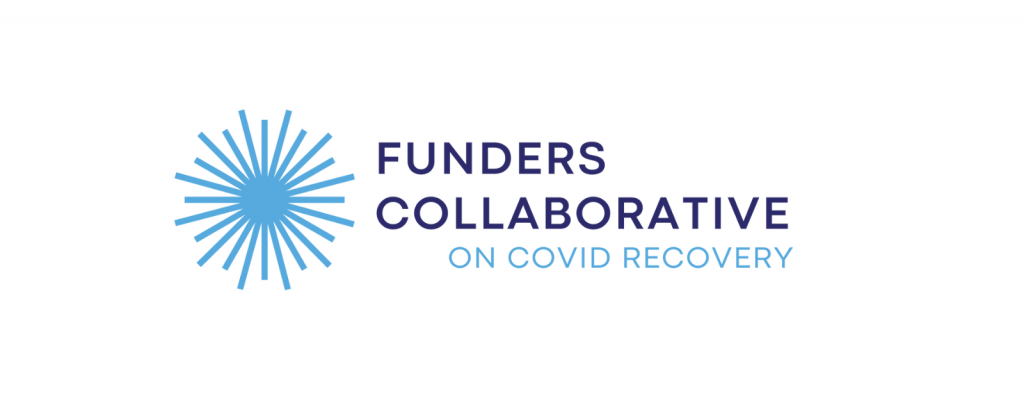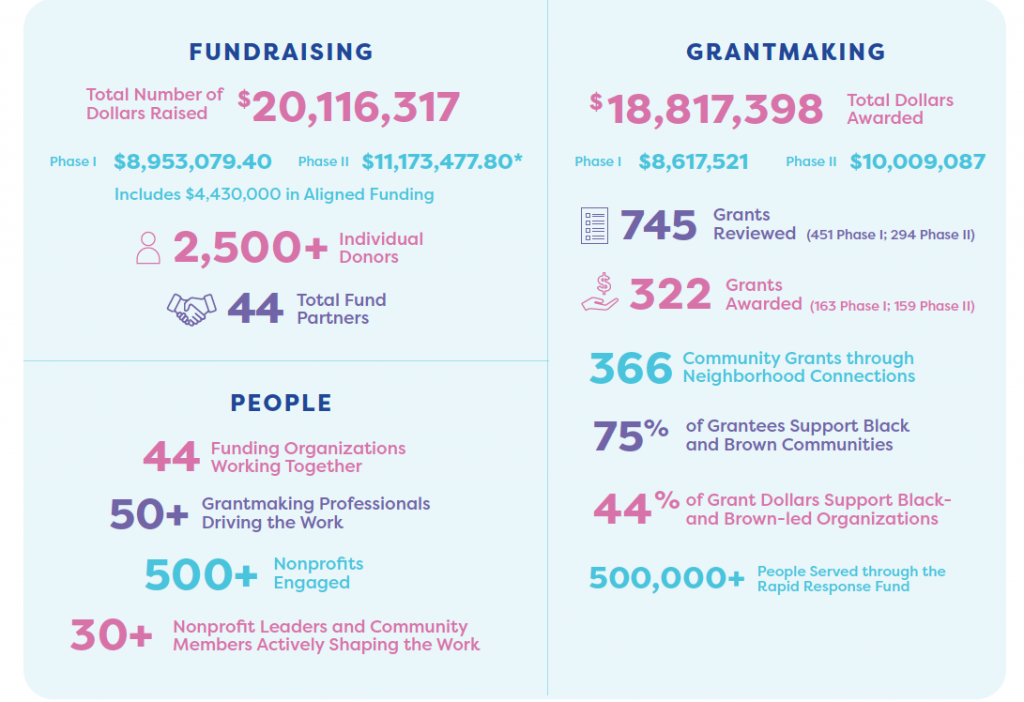
Funders Collaborative on COVID Recovery
updated oct. 10, 2022, 9 a.m. EST
The Greater Cleveland COVID-19 Rapid Response Fund (the Fund) was established in March 2020 to respond to pressing needs laid bare by the pandemic. It was designed to complement the work of public health and other public-sector agencies and expand nonprofit capacity to respond to health, safety and basic needs of residents throughout the region. Since September 2020, the Fund has expanded its scope beyond basic needs to include nonprofit resiliency, long-term recovery, and coronavirus vaccine uptake. To date the Fund has raised more than $20 million and made grants to 675 nonprofit groups and organizations in Cuyahoga, Lake and Geauga counties.
Learn more about what the Rapid Response Fund accomplished in Phases I & II
The partnership has grown to include nearly 50 philanthropic foundations, nonprofits, and government entities working together to help stabilize the region and spur long-term recovery with a particular focus on populations who are at especially high risk for the heath and economic consequences of the pandemic, including Black and other communities of color, refugees, immigrants, populations with low income and people with critical and chronic diseases.
In September 2021, the Fund launched the Funders Collaborative on COVID Recovery (FCCR) to implement its Phase III efforts. Building on the work of Phases I and II, Fund partners will shift their focus from rapid response grantmaking to long-term COVID recovery in Phase III, using their resources to:
- Increase vaccine access and uptake
- Address homelessness
- Advocate for long-term policy change that promotes economic well-being and equity
- Support grassroots advocacy efforts
- Build resilience in the nonprofit community
The Nonprofit COVID-19 Recovery and Resiliency Survey
In the winter of 2022, the FCCR conducted the Nonprofit COVID-19 Recovery and Resiliency Survey to better understand the current state and projected state of the nonprofit sector in Cuyahoga County.
Survey Areas:
- COVID Recovery/Resiliency: This section asks about nonprofit revenue, use of reserves, and overall experience through the COVID-19 pandemic as well as the organization’s plans for recovery.
- Capacity Building Needs: This section gathers information about nonprofit capacity building needs – specifically, what an organization views as the biggest areas to focus on in the next three years.
- Visioning: This section explores what organizations see as the north star for success and allows organizations to envision a stronger future.
- Demographic Information: This section requests information on leadership, board and staff, including race, gender, sexual orientation, disability identity and organizational faith-based status.
Survey results were released on May 19, 2022. You can watch the survey finds webinar here and access the survey findings report here.
You can explore the survey results via the interactive dashboard here. You can also review the full Cuyahoga County report here.
Issue Briefs
In fall 2022, the FCCR released deeper-dive briefs on 10 different nonprofit topics and industries. View more details in the reports below:
- Arts & Culture
- Behavioral Health
- Community Development
- Education
- Health
- Housing & Homeless Services
- Human Services
- Nonprofits Serving Older Adults
- Workforce Development
- Youth Development
Survey Findings Webinar
Frequently Asked Questions
What impact did the Rapid Response Fund have?
Through the generosity of our community, the Rapid Response Fund was able to make grants totaling nearly $19 million to 675 nonprofits in Cuyahoga, Geauga, and Lake counties. Read more in the Rapid Response Fund Final Report here.

What is the Funders Collaborative on COVID Recovery?
Building on the work of the Greater Cleveland COVID-19 Rapid Response Fund, the Funders Collaborative on COVID Recovery partners will shift their focus from rapid response grantmaking to long-term COVID recovery. In fall 2021, the Funders Collaborative on COVID Recovery (FCCR) was launched to support Greater Cleveland’s equitable recovery and the resiliency of residents. This partnership spans nearly 50 foundations, nonprofits and government agencies focused on a multi-year approach to helping our region recover from the COVID-19 pandemic and come back stronger.
The Funders Collaborative on COVID Recovery is guided by six fundamental principles set forth at the beginning of the Rapid Response Fund.
- Commit to Racial Equity
- Influence Through Advocacy
- Shared Learning and Measurement
- Collaborate Across Sectors
- Encourage Innovation
- Intentional Community Engagement
What are the priorities for the Funders Collaborative on COVID Recovery?
Initially, the Fund will use its resources to increase vaccine access and uptake; address homelessness; advocate for long-term policy change that promotes economic well-being and equity; support grassroots advocacy efforts; and build resilience in the nonprofit community. Six workgroups, some already existing in our community, including local government, nonprofits, and foundations, will be used to facilitate this work.
Will the Funders Collaborative on COVID Recovery continue rapid response grantmaking?
The Funders Collaborative on COVID Recovery (FCCR) is focused on the long-term recovery of Greater Cleveland. At this stage, the Funders Collaborative will not be accepting applications for rapid response grants. FCCR will not be making grants directly to nonprofit organizations as the Rapid Response Fund did. Nonprofits seeking additional support due to COVID-19 should reach out to their points of contact at individual philanthropic institutions to see if expenses related to the pandemic will be considered through individual foundation grant application processes.
I am an individual who has been affected by COVID-19. Can this fund help me?
We understand many people have been affected by COVID-19, and more will continue to be affected. The Greater Cleveland COVID-19 Rapid Response Fund, the earlier iteration of the Funders Collaborative on COVID Recovery (FCCR), deployed resources to nonprofit organizations that directly support residents who are at the highest risk for emerging health, economic and social impacts of the pandemic. The FCCR will not provide grants to individuals. If you are looking for resources now, please consider calling the United Way of Greater Cleveland’s 2-1-1 Help Center. Visit www.211OH.org or dial 2-1-1 for support and more information.
How can I help?
Please consider a donation to the Funders Collaborative on COVID Recovery. This contribution will strengthen our community’s ability to recover and thrive. If you’d like more information, please reach out to Andrew Katusin, Cleveland Foundation program officer for grantmaking initiatives, at akatusin@clevefdn.org, or your philanthropic advisor.
Can I restrict my funding to a specific grantee?
To ensure the Funders Collaborative on COVID Recovery focuses on building an equitable recovery responsive to the changing pandemic and community needs, we are not considering donations restricted to specific agencies or causes at this time.
How long will the Rapid Response Fund exist?
The application period for rapid response funding closed in August 2021. The Funders Collaborative on COVID Recovery (FCCR) is not providing rapid response grants at this time. Updates on the future of FCCR will be provided online at ClevelandFoundation.org/Recovery.
My nonprofit organization is looking for volunteers. What resources are available?
Greater Cleveland Volunteers is a terrific local resource for recruiting volunteers and can also help local nonprofit organizations safely re-engage volunteer workers to support their operations during the pandemic. For more information, visit: greaterclevelandvolunteers.org.
How can I learn more?
Sign up for the Cleveland Foundation monthly e-newsletter to stay in-the-loop on the latest foundation news and events as well as key developments from the Funders Collaborative for COVID Recovery and other community efforts.
Latest News
march 24, 2022
Funders Collaborative on COVID Recovery announces grantmaking to support vaccine uptake